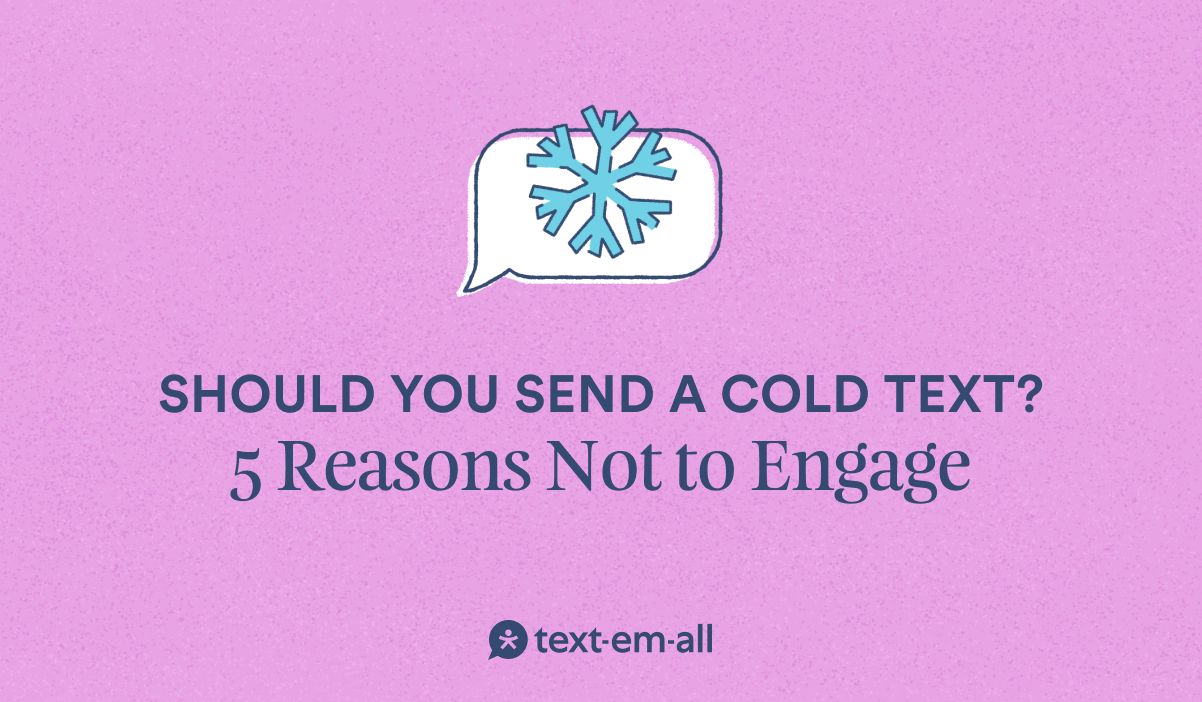
With all the media out there to consume, it’s hard to stand out in the noise, which is why businesses are constantly exploring new avenues for outreach and customer engagement.
One method that has gained traction in recent years is cold texting. Cold texting may initially seem like an easy option. However, it comes with its own set of risks and considerations. In this article, we’ll dive into the practice of cold texting, examining its effectiveness and ethical implications and, ultimately, questioning whether it’s a strategy worth pursuing.
Table of Contents
What is Cold Texting?
Cold texting, or cold messaging, involves sending unsolicited messages to individuals who have not expressed any prior interest in receiving communication from a business or organization. These texts typically promote products, services, or events and often lack any personalization or context tailored to the recipient.
Despite its widespread use, cold texting has increasingly been scrutinized for its effectiveness and ethical implications. As recipients receive more unsolicited messages, there's a growing awareness of the negative impact these practices can have on individuals' privacy and trust in digital communication channels.
Why Do Some Businesses Choose to Cold Text?
Businesses often turn to cold texting to reach a large audience quickly and inexpensively. Additionally, some may view it as a way to generate leads or drive sales without the need for extensive marketing efforts. However, the risks and drawbacks of this approach are increasingly apparent, prompting businesses to reassess the value of cold texting in their outreach strategies.
5 Reasons Not to Engage in Cold Texting
As we mentioned above, while cold texting seems convenient, the effectiveness and ethics of this approach warrant careful consideration, as it can lead to negative consequences for both the sender and the recipient. This section will explore five compelling reasons businesses should think twice before engaging in cold texting campaigns, considering legal risks, negative perceptions, and ethical concerns.
1. You Risk Legal Action
The main concern associated with cold texting is the risk of legal repercussions. In many jurisdictions, including the United States, the Telephone Consumer Protection Act (TCPA) requires businesses to obtain consent, also known as “opt-in,” from their recipients before they start sending texts. Failure to comply with these regulations can result in significant business fines and penalties. Considering that this practice is illegal in the United States, cold texting is risky and potentially costly for those who use it.
2. It Can Lead to a Negative Perception of Your Organization
Cold texting risks alienating recipients and creating a negative perception of your business or organization. Unsolicited messages are often considered intrusive and unwelcome, leading recipients to associate your brand with spam or unwanted solicitations. This can damage your reputation and undermine trust with potential customers, ultimately driving them away rather than attracting them to your products or services.
Read How to Reduce SMS Opt-Outs: 8 Helpful Strategies
3. Engagement and Conversion Rates are Lower
Cold texting typically yields lower engagement and conversion rates than other marketing strategies because recipients are less likely to respond positively to unsolicited messages. This often results in fewer leads and sales. With so many competing messages vying for attention in consumers' inboxes, cold texting often fails to cut through the noise and capture recipients' interest effectively.
4. Unsolicited Messages Interrupt Personal Space
Text messaging is a highly personal form of communication, often reserved for interactions with friends, family, and colleagues. Unsolicited messages disrupt this personal space, invading recipients' privacy and causing annoyance and frustration. Businesses need to respect recipients' preferences and boundaries to avoid alienating potential customers and damaging relationships before they even have a chance to develop.
5. There are Ethical Considerations
Beyond the legal and practical concerns, there are ethical considerations surrounding cold texting. Respect for individuals' consent and autonomy should be critical in any marketing strategy, and cold texting often ignores these principles. When businesses bombard recipients with unsolicited messages, they erode trust in digital channels such as texting and calling and compromise communication integrity. Ultimately, ethical factors should shape businesses’ approaches to engaging their target audience.
Read Introducing Text Message Opt-Outs Using Machine Learning
Alternatives to Cold Texting
Instead of relying on cold texting, businesses can explore alternative strategies that prioritize building genuine connections and fostering trust with their audience. These may include:
Warm Texting
Warm texting is exactly what it sounds like – the opposite of cold texting. It involves sending SMS messages to individuals who have already expressed interest in your brand, products, or services. This consent-based strategy ensures that your messages are welcomed and anticipated, rather than being perceived as intrusive or spammy.
Social Media Engagement
Rather than cold texting, businesses can leverage social media platforms to engage with their audience in a more organic and interactive manner. By sharing relevant content, responding to comments and messages, and participating in conversations, businesses can build a genuine connection with their followers and establish themselves as trusted authorities in their industry.
Content Marketing
Creating valuable content through blogs, podcasts, videos, or infographics can attract potential customers and provide them with useful information or entertainment. By focusing on delivering value rather than making direct sales pitches, businesses can establish themselves as valuable resources in their niche and earn the trust and loyalty of their audience over time.
Email Marketing with Opt-In Consent
Implementing targeted email marketing campaigns with explicit opt-in consent from recipients allows businesses to reach interested individuals without intruding on their personal space. By providing valuable content and offers tailored to their interests and preferences, businesses can nurture leads and build relationships with their subscribers, leading to higher engagement and conversion rates than cold texting.
Additionally, integrating warm SMS strategies with email marketing can significantly enhance the effectiveness of both channels. By combining the broad reach and content richness of email with the immediacy and higher open rates of SMS, businesses create a powerful dual-channel approach that engages customers more deeply and drives better results than relying on email alone.
By focusing on strategies that respect recipients' preferences and deliver value, businesses can forge stronger relationships with their audience and achieve more sustainable long-term success.
Create Real Connections With Your Recipients
Cold texting might seem like a fast and easy way to reach potential customers, but it raises important concerns about its effectiveness and whether it's ethical. Legal risks, negative perceptions, and low engagement rates all suggest businesses should think twice about using this approach. By focusing on getting consent, showing respect, and making real connections, businesses can build better relationships with their audience and grow more steadily over time.













